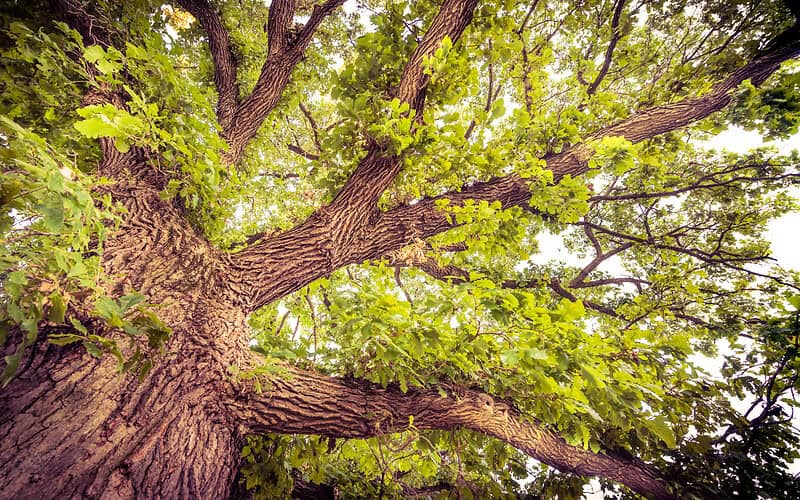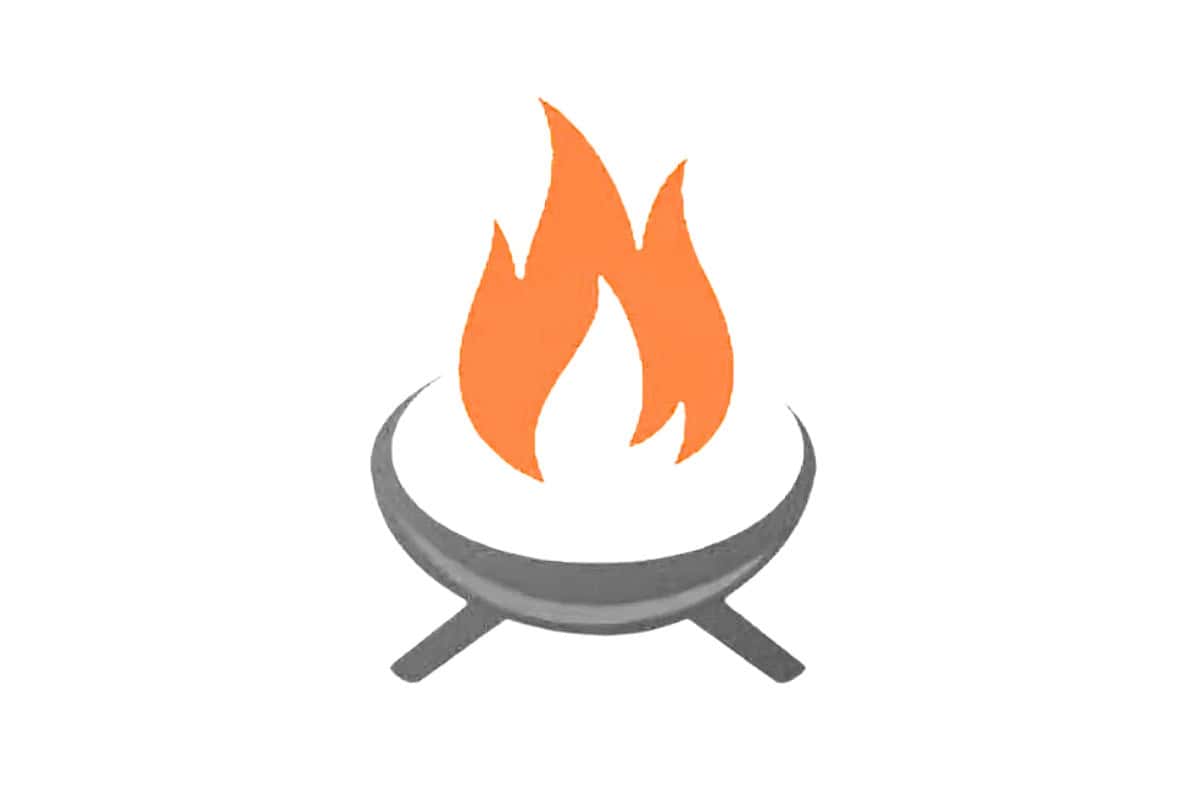
This comprehensive Bur Oak firewood profile explores the mighty giant of the prairie, delivering 24,000-26,000 BTUs per cord with exceptional heating characteristics and remarkable processing challenges.
Known for its massive size and incredibly dense wood, Bur Oak offers premium heat output for users willing to tackle one of nature’s most substantial hardwoods.
- Quick Reference Stats: Bur Oak Firewood Profle
- Overview & Identification
- Geographic Distribution
- Burning Characteristics
- Sensory Experience
- Processing & Preparation
- Specialized Uses
- Pros & Cons
- Best Practices & Tips
- Bottom Line: Bur Oak Firewood Profile
- 🌳 Bur Oak Quick Reference Table 🔥
- Related Resources: Bur Oak Firewood Profile
Quick Reference Stats: Bur Oak Firewood Profle
- Wood Type: Hardwood (white oak family)
- BTU Rating: 24,000-26,000 BTUs per cord
- Ease of Splitting: Difficult (2.5/5 scale)
- Seasoning Time: 18-24 months
- Smoke Production: Very Low
- Spark/Pop Factor: Very Low
- Scent Profile: Mild – Clean, slightly sweet oak aroma
Overview & Identification
Bur Oak stands as the monarch of prairie oaks, offering exceptional heat output from one of North America’s largest and most long-lived oak species.
This massive hardwood provides outstanding burning performance with the clean characteristics typical of white oaks, but demands significant patience during seasoning and processing due to its incredible density.
The enormous trunk diameter and distinctive deeply-lobed leaves make identification straightforward.
Common Names: Bur Oak, Burr Oak, Mossycup Oak, Prairie Oak
Scientific Name: Quercus macrocarpa (family Fagaceae)
Tree Characteristics: Massive deciduous tree reaching 70-100+ feet with trunk diameters often exceeding 3-4 feet. Features distinctive deeply-lobed leaves with rounded tips and large acorns with fringed caps. Renowned for drought tolerance and longevity.
Geographic Distribution
Where You’ll Find It: Great Plains and Midwest from Manitoba to Texas, east to the Atlantic states. Dominant species in oak savannas and prairie edge habitats
Availability: Excellent availability in Midwest from storm damage, land clearing, and tree services dealing with massive specimens
Growing Conditions: Extremely drought tolerant and adaptable to prairie conditions. Thrives in deep soils but tolerates challenging sites that defeat other oaks. Pioneer species in grassland transitions.
Burning Characteristics
Heat Output & Performance
- BTU Content: Exceptional performance delivering premium heat output among the finest hardwoods
- Burn Duration: Burns extremely long with outstanding heat retention throughout entire cycle
- Coaling Properties: Forms superb coals that maintain heat for extended periods – excellent overnight burning
- Flame Characteristics: Burns hot with steady, intense flames transitioning to exceptional coal beds
Ignition & Fire Management
- Ease of Lighting: Challenging to ignite due to extreme density – requires well-established fire
- Best Fire Stage: Outstanding primary fuel for serious heating and all-night burning applications
- Burn Rate: Very slow consumption provides maximum heat output per log
- Heat Consistency: Exceptional reliability with steady, intense heat delivery over extended periods
Sensory Experience
Smoke Profile
- Smoke Volume: Very low smoke production when properly seasoned – white oak characteristics
- Smoke Color: Minimal, clean smoke with excellent dispersal and pleasant appearance
- Smoke Flavor: Mild, clean flavor excellent for cooking applications without overpowering
- Creosote Production: Very low due to clean burning characteristics and minimal resin content
Sound & Visual
- Crackling/Popping: Quiet, steady burning with minimal crackling or aggressive popping
- Sparking Tendency: Very low spark production provides excellent safety profile
- Flame Appearance: Steady, intense flames with impressive heat radiating characteristics
Aroma
- Burning Scent: Clean, mild oak fragrance with subtle sweetness characteristic of white oaks
- Pleasant Factor: Pleasant and traditional – classic hardwood aroma that’s widely appreciated
- Intensity: Light to moderate aromatic presence that complements rather than dominates
Processing & Preparation
Splitting Characteristics
- Ease of Splitting: Extremely difficult due to incredible density and massive size pieces
- Grain Pattern: Straight grain but density and scale make splitting very challenging
- Tools Needed: Hydraulic splitter nearly essential – hand splitting extremely demanding
- Best Splitting Conditions: Split when green if possible – becomes nearly impossible when fully seasoned
Seasoning Requirements
- Drying Time: 18-24 months minimum for adequate seasoning due to extreme density and size
- Moisture Content: Takes extended time to reach target 15-20% due to massive piece size and density
- Seasoning Tips: Aggressive splitting essential to expose surface area – process immediately when available
- Storage Considerations: Requires excellent air circulation and extended patience for proper seasoning
Processing Notes
- Chainsaw Considerations: Extremely hard, dense wood that challenges chainsaw equipment – maintain sharp chains
- Bark Characteristics: Thick, deeply furrowed bark characteristic of mature white oaks
- Handling: Extremely heavy, massive pieces – among the most physically demanding to handle
- Size Challenges: Enormous trunk diameters require specialized processing equipment and techniques
Specialized Uses
Premium Heating Applications
- Serious Heating: Outstanding choice for heating large spaces with maximum efficiency
- All-Night Burning: Exceptional coaling properties provide reliable overnight heat retention
- Energy Efficiency: Maximum BTU output reduces wood consumption and processing frequency
- Commercial Applications: Preferred choice for workshops, barns, and large commercial heating needs
Cooking & Smoking Applications
- High-Heat Cooking: Excellent for applications requiring sustained high temperatures over long periods
- Smoking Applications: White oak characteristics provide clean smoke excellent for long smoking sessions
- Traditional BBQ: Prized for authentic barbecue requiring steady, clean heat for hours
- Pizza Ovens: Outstanding choice for wood-fired ovens requiring intense, sustained heat
Pros & Cons
Advantages
- Exceptional BTU output – among highest available in oak family
- Burns extremely clean with minimal smoke production typical of white oaks
- Outstanding coaling properties for extended heat retention
- Excellent safety profile with minimal sparking
- Very low ash production for easy cleanup
- Burns for extremely long periods reducing feeding frequency
- Clean burning makes excellent cooking and smoking wood
- Sustainable use of storm-damaged and land-clearing trees
- Represents ultimate heating efficiency reducing overall wood needs
- Classic white oak characteristics highly prized by wood burners
Disadvantages
- Extremely difficult processing requires specialized equipment and significant effort
- Very long seasoning time tests patience and requires advanced planning
- Massive size pieces challenge standard processing equipment
- Extremely heavy, dense wood makes handling physically demanding
- May require professional processing for safety and efficiency
- Can be expensive due to processing challenges and premium quality
- Very challenging to ignite without well-established fire
- Limited availability outside Great Plains and Midwest regions
- Requires significant storage space during extended seasoning period
Best Practices & Tips
Processing Strategy & Safety
- Equipment Investment: Hydraulic splitter with high tonnage capacity nearly essential
- Professional Processing: Consider commercial processing for safety and efficiency with massive pieces
- Timing Critical: Process immediately when available while green – seasoned Bur Oak extremely difficult
- Size Management: Cut to manageable lengths before attempting to split large diameter pieces
Fire Management Optimization
- Fire Building: Use faster-lighting woods to establish substantial fire base before adding Bur Oak
- Loading Strategy: Add to well-established fires for maximum heat output and proper ignition
- Mixing Ratios: Combine with easier-lighting woods for optimal fire management and startup
- Overnight Strategy: Load established fires with Bur Oak for reliable all-night burning capability
Seasoning Optimization
- Immediate Processing: Split as soon as available to maximize seasoning time
- Storage Planning: Plan for 2+ year seasoning cycle with excellent air circulation
- Space Requirements: Ensure adequate storage space for extended seasoning period
- Quality Testing: Use moisture meter to verify proper seasoning before burning
Bottom Line: Bur Oak Firewood Profile
The Bur Oak firewood profile represents the ultimate premium hardwood for serious heating applications, offering exceptional BTU performance that justifies the significant processing investment required.
While the Bur Oak firewood profile demands both equipment and patience, its outstanding heat output and clean burning characteristics make it the gold standard for users who prioritize maximum heating efficiency and are equipped to handle its processing demands.
Best For: Serious heating needs, users with hydraulic splitters, professional processing options, maximum BTU requirements, Midwest availability, and experienced processors seeking ultimate performance
Skip If: You lack proper splitting equipment, need easily processed wood, are a beginner, require quick seasoning, or don’t need maximum heat output
Ready to compare Bur Oak’s stats at a glance? Dive into this handy quick reference table for the essential facts and performance highlights!
🌳 Bur Oak Quick Reference Table 🔥
Bur Oak is the heavyweight champion of North American firewood. Insanely dense, this species delivers unmatched heat, coaling, and burn-time for extreme winter nights. When you want oak’s famed safety and reliability—with premium performance and a classic scent—Bur Oak sets the standard for overnight and cold weather heating, every single burn.
| Characteristic | Rating/Value | Notes |
|---|---|---|
| 🔥 BTU per Cord | 24,000-26,000 | Exceptional heat output |
| ⚖️ Density | Extremely High | Among densest oaks |
| ⏰ Seasoning Time | 18-24 months | Extended drying required |
| 🪓 Splitting Difficulty | Difficult (2.5/5)⭐ | Hydraulic splitter essential |
| 💨 Smoke Production | Very Low | Clean white oak burning |
| ✨ Spark/Pop Factor | Very Low | Excellent safety |
| 🚀 Ignition Ease | Challenging | Needs well-established fire |
| ⚡ Burn Rate | Very Slow | Maximum burn time |
| 🔥 Coaling Ability | Exceptional | Outstanding coal formation |
| 🌸 Scent Quality | Pleasant | Classic mild oak aroma |
| 🍳 Cooking Suitability | Excellent | Clean burn, sustained heat |
| 🌱 Sustainability | Good | Storm damage, land clearing |
| 📍 Regional Availability | Great Plains/Midwest | Limited elsewhere |
| 💰 Cost Level | Premium | Reflects processing demands |
| 🎯 Best Use | Serious heating, overnight burning | Ultimate heating performance |
| 🏆 Overall Rating | Premium oak excellence |
Related Resources: Bur Oak Firewood Profile
Last updated: 8/20/2025


